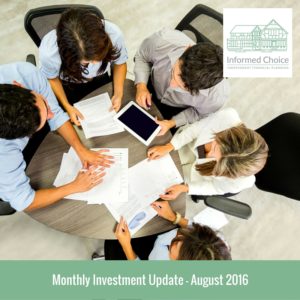 In our latest monthly investment update for August 2016, we look at how the investment markets, global economy and commodity prices are performing.
In our latest monthly investment update for August 2016, we look at how the investment markets, global economy and commodity prices are performing.
The FTSE 100 index of leading UK company shares finished July at 6,721.06 points, up by 216.73 points or 3.33% during the month.
UK companies experienced a sustained rally, shaking off earlier concerns following the referendum result. Rising commodity prices and a weaker pound following the UK’s decision to leave the European Union helped to push the benchmark index higher for five consecutive weeks.
Towards the end of July, the FTSE 250 index surpassed its level from before the referendum. This broader based index of UK companies is considered by many as the better indicator than the FTSE 100 of the health of the British economy.
A new survey by the Confederation of British Industry has found UK businesses expect growth to stagnate during the next quarter. In its first monthly report since the referendum result, the CBI found growth held steady in consumer services and strengthened in manufacturing. It was however weaker in business and professional services and retailing.
Businesses expect private sector growth fall by 3% over the next three months. This represents eh weakest expectations balances since December 2012. The decline in expectations was most marked in consumer services and retail, according to the survey.
The Bank of England is due to publish its quarterly inflation forecast in the first week of August. It is expected to cut interest rates for the first time since the onset of the global financial crisis in March 2009, in response to economic uncertainty following the referendum result.
In its last quarterly inflation report, the Bank forecast the British economy would grow by 2.3% in 2016. Economists now expect this forecast to be cut to under 1%, representing a significant downgrade to the Bank’s forecast.
According to data firm IHS Markit, a measure of private sector activity in the UK, its composite Purchasing Managers Index, fell sharply in July to its lowest level since early 2009. Its PMI fell to 47.7 in July from 52.4 in June. This represents the sharpest one-month fall on record. A PMI reading under 50 suggests a decline in business activity.
It’s worth noting that the composite PMI can sometimes give a misleading steer. It has fallen below 50 in 1998, 2001 and 2003 without the British economy falling into recession.
House prices rose slightly in July, with Nationwide reporting an increase of 0.5% in July compared with June. Average house prices were up 5.2% compared to a year earlier. The average UK home was valued at £205,715, rising above £205,000 for the first time.
Commenting on the impact of the referendum result on house prices, Nationwide’s chief economist Robert Gardner said, “Any impact from the vote may not be fully evident in July’s figures, as there is a short lag between a buyer making the decision to purchase a property and applying for a mortgage,”
The official measure of price inflation in the UK, the Consumer Prices Index (CPI), rose by 0.5% in the year to June. This was up from 0.3% in May. The rise was attributed to higher air fares, fuel and consumer spending.
Price inflation in the Eurozone has started to pick up slowing, with Eurostat’s preliminary Consumer Price Index reading for July showing inflation of 0.2% in the month. This is up from 0.1% in June. On a year-to-year basis core consumer prices grew by 0.9%.
The benchmark 10 year UK Gilt yield stands at 0.685% at the end of July, continuing to fall as investors seek a safe haven following the referendum result and market expect further monetary easing.
£1 buys $1.32300 or €1.18370. The Forex Gold Index is $1342.00/oz and the Silver Index is $20.04/oz.

